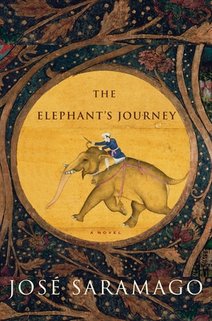
10 Sep 2010 19:31:40
This is a book Serious Readers should love. Consider the pedigree: a recently deceased Nobel Prize-winning author, a benevolent animal protagonist and a space on bookstore and library shelves in the hot category Historical Fiction.
None of which explains why this reviewer couldn't read more than 10 pages at a time. Blame that on Saramago's modernist approach — long blocks of text with no quotation marks or paragraph breaks. It's not a new device for him, but it is jarring to readers like this one who encounter it for the first time. Think ee cummings reborn as a novelist.
The plot is interesting enough. Saramago imagines the real-life journey an elephant named Solomon took in 1551 from Lisbon to Vienna. Solomon was a wedding gift from Portugal's King Joao III to Austrian Archduke Maximilian. Loosely basing the story on historical documents and popular descriptions of the expedition, Saramago weaves together a tale that takes the elephant and his entourage from the Portuguese coast through Spain and over the Alps to Austria.
The omniscient and very self-aware narrator is by far the funniest part of the book. Describing a scene when Solomon and his trainer, called a mahmout, get lost in fog, Saramago writes: "The man who insisted he'd heard the elephant speak began to lose consistency and substance, to shrink, then grow round and transparent as a soap bubble. He went plof and vanished. Onomatopoeia can be so very handy. Imagine if we'd had to provide a detailed description of someone disappearing. It would have taken us at least ten pages. Plof."
In the end, the book plofs toward what can be loosely called a resolution. There's no real conflict among the characters, and certainly no suspense. But it is a posthumous novel from a Portuguese national treasure — and that alone will attract readers. Nothing we write will.
None of which explains why this reviewer couldn't read more than 10 pages at a time. Blame that on Saramago's modernist approach — long blocks of text with no quotation marks or paragraph breaks. It's not a new device for him, but it is jarring to readers like this one who encounter it for the first time. Think ee cummings reborn as a novelist.
The plot is interesting enough. Saramago imagines the real-life journey an elephant named Solomon took in 1551 from Lisbon to Vienna. Solomon was a wedding gift from Portugal's King Joao III to Austrian Archduke Maximilian. Loosely basing the story on historical documents and popular descriptions of the expedition, Saramago weaves together a tale that takes the elephant and his entourage from the Portuguese coast through Spain and over the Alps to Austria.
The omniscient and very self-aware narrator is by far the funniest part of the book. Describing a scene when Solomon and his trainer, called a mahmout, get lost in fog, Saramago writes: "The man who insisted he'd heard the elephant speak began to lose consistency and substance, to shrink, then grow round and transparent as a soap bubble. He went plof and vanished. Onomatopoeia can be so very handy. Imagine if we'd had to provide a detailed description of someone disappearing. It would have taken us at least ten pages. Plof."
In the end, the book plofs toward what can be loosely called a resolution. There's no real conflict among the characters, and certainly no suspense. But it is a posthumous novel from a Portuguese national treasure — and that alone will attract readers. Nothing we write will.

